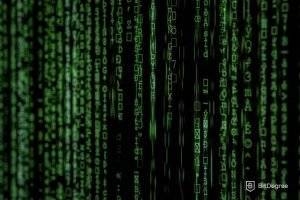Stop overpaying - start transferring money with Ogvio. Sign up, invite friends & grab Rewards now! 🎁
Every day, there are vast amounts of information entering the internet. The actual number could be hard to even comprehend! Such amounts of various data need to be structured and organized for them to make any sense. This is where data science comes in - it provides a way of making sense of all of that information.
Naturally, there’s a huge need for qualified data scientists in the market. The job opportunities for this position are constantly increasing, as are ways to enter the market – take online data science courses on platforms like DataCamp and Udacity, for example. So if you’re thinking about applying for a data scientist job position, you’ll need to know the essential data science interview questions. This tutorial will provide you with exactly that.

The guide is split into two big parts - the basics and the more advanced stuff. Well talk about big data interview questions, differentiate data scientists from data analysts and so on. At the very end, I'll give you a couple of tips and we'll summarize the tutorial.
Table of Contents
- 1. Definitions of Data Science
- 1.1. Question 1: What is ‘data science’?
- 1.2. Question 2: What’s the difference between ‘data science’ and ‘big data’?
- 1.3. Question 3: What’s the difference between a ‘data scientist’ and a ‘data analyst’?
- 1.4. Question 4: What are the fundamental features that represent big data?
- 1.5. Question 5: What’s a ‘recommender system’?
- 1.6. Question 6: Name a reason why Python is better to use in data science instead of most other programming languages.
- 1.7. Question 7: What is A/B testing?
- 1.8. Question 8: What is Hadoop and why should I care?
- 1.9. Question 9: What is a ‘selection bias’?
- 1.10. Question 10: What is a ‘power analysis’?
- 1.11. Question 11: What do you know about ‘Normal Distribution’?
- 1.12. Question 12: What is the statistical power of sensitivity?
- 1.13. Question 13: Can you name the differences between overfitting and underfitting?
- 1.14. Question 14: Do you know what is Eigenvectors and Eigenvalues?
- 1.15. Question 15: Can you tell how the validation set with the test set differs?
- 2. Advanced-Data Science Interview Questions
- 2.1. Question 1: Define ‘collaborative filtering’.
- 2.2. Question 2: What’s ‘fsck’?
- 2.3. Question 3: What is ‘cross-validation’?
- 2.4. Question 4: Which is better - good data or good models?
- 2.5. Question 5: What’s the difference between ‘supervised’ and ‘unsupervised’ learning?
- 2.6. Question 6: What’s the difference between ‘expected value’ and ‘mean value’?
- 2.7. Question 7: What’s the difference between ‘bivariate’, ‘multivariate’ and ‘univariate’?
- 2.8. Question 8: What if two users were to access the same HDFS file at the same time?
- 2.9. Question 9: How many common Hadoop input formats are there? What are they?
- 2.10. Question 10: What’s ‘cluster sampling’?
- 3. General Tips
Definitions of Data Science
Let’s take it from the top and talk definitions.
Latest DataCamp Coupon Found:A lot of your early data analyst interview questions might include differentiating between seemingly similar, yet somewhat different terms. That’s why it’s probably a good idea to start from these definitions so that you have a clear understanding of what is moving forward.
Question 1: What is ‘data science’?
Data science is a form of methodology that is used to extract and organize various data and information out of huge data sources (both structured and unstructured).
The way that this form of science works is that it uses various algorithms and applied mathematics to extract useful knowledge and information and arrange it in a way that would make sense and grant some sort of usage.
Question 2: What’s the difference between ‘data science’ and ‘big data’?
Surely one of the more tricky data science interview questions, a lot of people fail to express a clear difference. This is mostly because of a lack of information surrounding the topic.
However, the answer itself is very simple - since the term ‘big data’ implies huge volumes of data and information, it needs a specific method to be analyzed. So, big data is the thing that data science analyzes.
Question 3: What’s the difference between a ‘data scientist’ and a ‘data analyst’?
Even though this is also one of the basic data analyst interview questions, the terms still often tend to get mixed up.
Data scientists mine, process and analyze data. They are concerned with providing predictions for businesses on what problems they might come across.
Data analysts solve unavoided business problems instead of predicting them. They identify issues, perform analysis of statistical information and document everything.
Question 4: What are the fundamental features that represent big data?
Now that we’ve covered the definitions, we can move to the specific data science interview questions. Keep in mind, though, that you are bound to receive data scientist, analyst, and big data interview questions. The reason why is because all of these subcategories are intertwined with each other.
Five categories represent big data, and they’re called the “5 Vs”:
- Value;
- Variety;
- Velocity;
- Veracity;
- Volume.
All of these terms correspond with big data in one way or another.
Question 5: What’s a ‘recommender system’?
It is a type of system that is used for predicting how high of a rating would users give to certain specific objects (movies, music, merchandise, etc.). Needless to say, there are a lot of complex formulas involved in such a system.
Question 6: Name a reason why Python is better to use in data science instead of most other programming languages.
To nail your data science interview questions it is essential to know about Python. Naturally, Python is very rich in data science libraries, it's amazingly fast and easy to read or learn. Python's suite of specialized deep learning and other machine learning libraries includes popular tools like sci-kit-learn, Keras, and TensorFlow, which enable data scientists to develop sophisticated data models that plug directly into a production system.
|
|
|
|
|---|---|---|
| 507 | +1K | |
| 16 | 10 | |
| 14M | 1,4M | |
| Visit site Read review | Visit site Read review |
Table: DataCamp VS BitDegree
To unearth insights from the data, you'll have to use Pandas, the data analysis library for Python. It can hold large amounts of data without any of the lag that comes from Excel. You can do numerical modeling analysis with Numpy. You can do scientific computing and calculation with SciPy. You can access a lot of powerful machine learning algorithms with the sci-kit learn code library. With Python API and the IPython Notebook that comes with Anaconda, you will get powerful options to visualize your data.
Question 7: What is A/B testing?
While A/B testing can be applied in various niches, it is also one of the more prominent data science interview questions. So what is it?
A/B testing is a form of tests conducted to find out which version of the same thing is more worth using to achieve the desired result.
Say, for example, that you want to sell apples. You’re not sure what type of apples - red or green ones - your customers will prefer. So you try both - first you try to sell the red apples, then the green ones. After you’re done, you simply calculate which were the more profitable ones and that’s it - that’s A/B testing!
Question 8: What is Hadoop and why should I care?
Notice! Hadoop is an open-source distributed processing framework that manages data processing and storage for big data applications running in clustered systems.
To answer your data science interview questions splendidly Apache Hadoop is a collection of open-source software utilities that facilitate using a network of many computers to solve problems involving massive amounts of data and computation. It provides a software framework for distributed storage and processing of big data using the MapReduce programming model.
Hadoop splits files into large blocks and distributes them across nodes in a cluster. It then transfers the packaged code into nodes to process the data in parallel. This allows the dataset to be processed faster and more efficiently than it would be in more conventional supercomputer architecture.
Question 9: What is a ‘selection bias’?
Selection bias is the bias introduced by the selection of individuals, groups or data for analysis in such a way that proper randomization is not achieved, thereby ensuring that the sample obtained is not representative of the population intended to be analyzed.
If the selection bias is not taken into account, then some conclusions of the study may not be accurate.
Question 10: What is a ‘power analysis’?
Another among the many definitions in the data science interview questions is 'power analysis'. It is a type of analysis that’s used to determine what sort of effect will a unit has simply based on its size.
Power analysis is directly related to tests of hypotheses. The main purpose underlying power analysis is to help the researcher to determine the smallest sample size that is suitable to detect the effect of a given test at the desired level of significance.
Question 11: What do you know about ‘Normal Distribution’?
Data is distributed in different ways with a bias to the left or to the right or it can all be jumbled up. However, there is a chance that data will reach a form of a bell-shaped curve without any bias to the left or to the right.
Features of Normal Distribution:
- Unimodal - one mode
- Symmetrical - left and right halves are mirror images
- Bell-shaped - maximum height at the mean
- Mean, Mode, Median are all located in the center
- Asymptotic
Question 12: What is the statistical power of sensitivity?
This might one of the trickier data science interview questions. Sensitivity is commonly used to validate the accuracy of a classifier, for example, Logistic, Random Forest, SVC.
Sensitivity is “Predicted True Events/Total Events”.
True Events are the events that were true and the model also predicted them as true.
The calculation of seasonality is straightforward. The formula goes Seasonalit=(True Positives) / (Positives in Actual Dependent Variable).
Question 13: Can you name the differences between overfitting and underfitting?
You can start by defining what it actually is. In overfitting, a statistical model describes random error or noise instead of the underlying relationship. It occurs when a model is excessively complex, for example as having too many parameters relative to the number of observations. A model that has been overfitted has poor predictive performance because it overreacts to minor fluctuations in the training data.
On the other hand, underfitting occurs when a machine learning algorithm or a statistical model cannot capture the underlying trend of data. Underfitting will occur if you try to fit a linear model to non-linear data. It would also have poor predictive performance. Be sure to not mix these up in data science interview questions cause it might be crucial.
Question 14: Do you know what is Eigenvectors and Eigenvalues?
Well, of course, you do. Eigenvectors are used to understand linear transformation. In data analysis, eigenvectors are usually calculated for a correlation or covariance matrix.
Eigenvalue can be referred to as the strength of the transformation in the direction of eigenvector or the factor by which the compression occurs.
Question 15: Can you tell how the validation set with the test set differs?
A validation set is a part of the training set that is used for parameter selection as well as for avoiding overfitting of the ML model being developer. Alternatively, a test set is meant for evaluating or testing the performance of a trainer ML model.
Advanced-Data Science Interview Questions
Now that we’ve covered the basic, introductory level data analyst interview questions, let’s move on to the more advanced stuff.

The material provided ahead is a mixture of data scientists, big data and data analyst interview questions. These are the types of questions that you might be specifically asked to elaborate on.
Question 1: Define ‘collaborative filtering’.
Collaborative filtering, as the name implies, is a filtering process that a lot of recommender systems utilize. This type of filtering is used to find and categorize certain patterns.
Collaborative filtering is a method of making automatic predictions (filtering) about the interests of a user by collecting preferences or taste information from many users (collaborating). This type of filtering is used to find and categorize certain patterns.
Question 2: What’s ‘fsck’?
It is important in data science interview questions to know that ‘fsck’ abbreviates as “File System Check”. It is a type of command that looks for possible errors within the file and, if there are errors or problems found, fsck reports them to the Hadoop Distributed File System.
Question 3: What is ‘cross-validation’?
Yet another addition to the data analyst interview questions, cross-validation can be quite difficult to explain, especially in a simplistic and easily understandable manner.
Cross-validation is used to analyze if an object will perform the way that it is expected to perform once put on the live servers. In other words, it checks how certain results of specific statistical analyses will measure when placed into an independent set of data.
Question 4: Which is better - good data or good models?
This might be one of the more popular big data interview questions, although it falls into the category of data science interview questions, as well.
The answer to this question is truly very subjective and case-by-case dependant. Bigger companies might prefer good data, for it is the core of any successful business. On the other hand, good models couldn’t be created without having good data.
You should probably pick according to your personal preference - there isn’t any right or wrong answer (unless the company is specifically searching for either one of them).
Question 5: What’s the difference between ‘supervised’ and ‘unsupervised’ learning?
Although this isn’t one of the most common data scientist interview questions and has more to do with machine learning than with anything else, it still falls under the umbrella of data science, so it’s worth knowing.
During supervised learning, you would infer a function from a labeled portion of data that’s designed for training. The machine would learn from the objective and concrete examples that you provide.
Unsupervised learning refers to a machine training method that uses no labeled responses - the machine learns by descriptions of the input data.
Question 6: What’s the difference between ‘expected value’ and ‘mean value’?
When you reach this advanced data science interview questions part When it comes to functionality, there’s no difference between the two. However, they are both used in different situations.
Expected values usually reflect random variables, while mean values reflect the sample population.
Question 7: What’s the difference between ‘bivariate’, ‘multivariate’ and ‘univariate’?
Bivariate analysis is concerned with two variables at a time, while multivariate analysis deals with multiple variables. Univariate analysis is the simplest form of analyzing data. "Uni" means "one", so in other words, your data has only one variable. It doesn't deal with causes or relationships (unlike regression) and its major purpose is to describe; it takes data, summarizes that data and finds patterns in the data.
Question 8: What if two users were to access the same HDFS file at the same time?
This is also one of the more popular data scientist interview questions - and it’s somewhat of a tricky one. The answer itself isn’t difficult at all, but it’s easy to mix it up with how similar programs react.
If two users are trying to access a file in HDFS, the first person gets the access, while the second user (that was a bit late) gets denied.
Question 9: How many common Hadoop input formats are there? What are they?
One of the interview questions for a data analyst that might also show up in the list of data science interview questions. It’s difficult because you not only need to know the number, but also the formats themselves.
In total, there are three common Hadoop input formats. They go as follows: key-value format, sequence file format, and text format.

- Easy to use with a learn-by-doing approach
- Offers quality content
- Gamified in-browser coding experience
- Free certificates of completion
- Focused on data science skills
- Flexible learning timetable

- High-quality courses
- Nanodegree programs
- Student Career services
- Nanodegree programs
- Suitable for enterprises
- Paid certificates of completion

- A wide range of learning programs
- University-level courses
- Easy to navigate
- University-level courses
- Suitable for enterprises
- Verified certificates of completion
Question 10: What’s ‘cluster sampling’?
Cluster sampling refers to a type of sampling method. With cluster sampling, the researcher divides the population into separate groups, called clusters. Then, a simple random sample of clusters is selected from the population. The researcher conducts his analysis of data from the sampled clusters.

Did you know?
Have you ever wondered which online learning platforms are the best for your career?
General Tips
Now that we’ve discussed both the basic and the more advanced data science interview questions, let’s have a quick revision of what we’ve learned.

The most important thing that you should remember for the beginning of your job interview is the definitions. If you have the definitions down and can explain them in an easily understandable manner, you’re guaranteed to leave a good and lasting impression on your interviewers.
After that, make sure to revise all of the advanced topics. You don’t necessarily need to go in-depth with each one of the thousands of data analyst interview questions out there. Revising the main topics and simply getting to know the concepts that you're still unfamiliar with should be your aim before the job interview.
Your main goal at the interview should be to show the knowledge that you possess. Whether it be data science interview questions or anything else - if your employer sees that you’re knowledgeable on the topic, he’s much more likely to consider you as a potential employee.
Remember, though - knowledge is just one part of the equation. The other things that employers are actively looking for are humility, respect, reputability, trustworthiness, etc. You should also aim to display these and the rest of your good features during the job interview. Don’t be afraid to talk about yourself, but stay humble - there’s a fine line between knowing your worth and simply boasting. If you need any more guidance on becoming a data science expert head over to BitDegree learning paths or read our guides on learning data science-related programming languages like Python with DataCamp and start your journey today!









